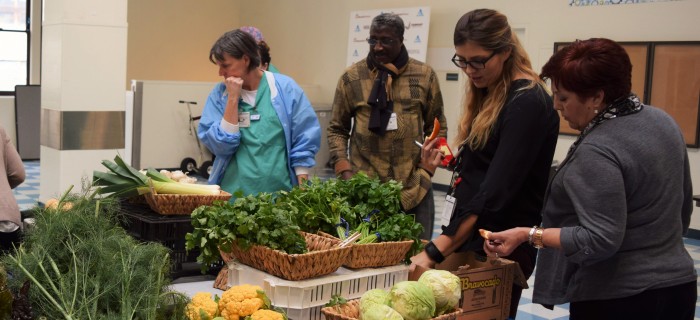The Politics of Food: The More Things Stay the Same, the More They Change
After four decades of working to end the injustices that cause hunger, the tide is finally turning. As the nation’s first think tank on food, Food First is both hopeful and humbled by the growing wave of public concern on food issues and by the rise of exciting social movements for food justice, food sovereignty, and food democracy.
When Diet for a Small Planet by Frances Moore Lappé came out in 1971 it was revolutionary. Lappé laid out the evidence that contradicted the expert wisdom on hunger and scarcity:
- There is 1 ½ times more than enough food to feed everyone on the Earth,
- hunger is due to poverty, not scarcity,
- and the way the developed world produces and consumes food is damaging the planet.
Lappé’s book became a bestseller, though that didn’t immediately change the way people went about addressing world hunger. So, Lappé and her colleague, Joseph Collins, wrote another book called Food First: Beyond the Myth of Scarcity (1974) and founded The Institute of Food and Development Policy, popularly known as Food First,. Then they published World Hunger: Twelve Myths. Food First challenged the mainstream notions of scarcity, overpopulation, the Green Revolution, and free trade, among other “myths” commonly associated with hunger.
Hunger is not a myth, they argued, but how we have learned to understand and combat hunger is based on myths.
Food First has gone on to publish over 50 books and hundreds of reports, articles, and papers. We’ve also become a training ground for thought leaders that went on to found many other vital organizations like Pesticide Action Network, Neighbor to Neighbor, Global Exchange, Center for Living Democracy, Focus on the Global South, Korea Policy Institute, Land Research Action Network, Oakland Institute, and the Oakland Food Policy Council. All of these initiatives challenge the status quo and work for healthy, equitable food systems.
Astoundingly, what Frances Moore Lappé wrote back in 1971 is still true today: the world produces 1 ½ times more than enough food to feed everyone—enough to feed 10 billion people, the expected limit of global population growth in 2050. Further, the corporate food system contributes up to 1/3 of the world’s greenhouse gases, making industrial agriculture one of the main forces behind climate change.
To those just getting involved in the new “food movement,” it may seem that we are not making much progress on ending hunger or environmental destruction.
Stay in the loop with Food First!
Get our independent analysis, research, and other publications you care about to your inbox for free!
Sign up today!But let’s think again. The understanding that poverty—not scarcity—is at the root cause of hunger, has been accepted at the United Nations’ office on The Right to Food; the global movement for Food Sovereignty has hundreds of millions of supporters challenging the destructiveness and inequity of the dominant food system and calling for a more democratic and sustainable approach to food; hundreds upon hundreds of community organizations in the U.S. food justice movement are demanding good, clean, fair food; and, they are growing it, taking back control over their community food security.
In reality, the paradigm about food, hunger, and the environment has shifted. It has changed from one of fear and scarcity to one of participation, fairness, and sustainability. People are not only thinking and talking in new ways about the issues—they are informed, active, and engaged as never before.
Food First has been a part of this growing movement from the very beginning. Our steadfast commitment to ending the injustices that cause hunger by changing the way people think has paid off. As a member-supported organization, we have been able to speak truth to power without worrying about financial or economic retaliation. This has kept us shoulder to shoulder with the farmers, activists, and community leaders on the front lines of systems change.
We’re still at it. Our latest two books “Fertile Ground: Scaling Agroecology from the Ground Up,” and “Land Justice: Re-imagining land, food and the commons in the United States,” are powerful anthologies from the communities in the U.S. and around the world that are transforming our food systems, and our societies.
Right-wing foundations in the United States lavish money on their think tanks in an effort to create an ideological consensus of corporate dominance, climate denial and the privatization of everything (progressive foundations tend to fund projects that clean up the right wing’s mess). It is heartening to know that Food First, “a people’s think tank” supported by the grassroots has been able to change these narratives.
Together, we are fighting for sustainability, equity, and human decency. We refuse to succumb to the cynicism of “the more things change, the more they remain the same.” In our 41 years of engagement with the politics of food, the more things try to remain the same—thanks to informed activism—the more they change.


 Help Food First to continue growing an informed, transformative, and flourishing food movement.
Help Food First to continue growing an informed, transformative, and flourishing food movement.




